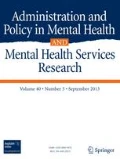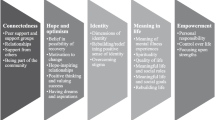Abstract
The purpose of this qualitative study is to understand how mental health and related services support and hinder resilience in young people diagnosed with first-episode psychosis. Seventeen youth between the ages of 18–24 were recruited and 31 in-depth interviews were conducted. Findings illustrated that informational and meaning making, instrumental, and emotional supports were experienced positively (i.e., resilience-enhancing); whereas services with ghettoizing, engulfing, regulating, and out of tune practices were experienced negatively (i.e., resilience-hindering). These results demonstrate how various types of service-related practices influence resilience in youth and can inform future planning of services for psychosis.
Similar content being viewed by others
References
Amminger, G., Harris, M., Conus, P., Lambert, M., Elkins, K. S., Yuen, H. P., & McGorry, P. D. (2006). Treated incidence of first-episode psychosis in the catchment area of EPPIC between 1997 and 2000. Acta Psychiatrica Scandinavica, 114(5), 337–345.
Arnett, J. J. (2000). Emerging adulthood: A theory of development from the late teens through the twenties. American Psychologist, 55(5), 469–480.
Arnett, J. J. (2014). Emerging adulthood: The winding road from the late teens through the twenties. New York: Oxford University Press.
Barnett, E., & Casper, M. (2001). A definition of “social environment”. American Journal of Public Health, 91(3), 465.
Bottrell, D. (2009). Understanding ‘marginal’perspectives towards a social theory of resilience. Qualitative Social Work, 8(3), 321–339.
Bottrell, D., & Armstrong, D. (2012). The social ecology of resilience (pp. 247–264)., Local resources and distal decisions: The political ecology of resilience New York: Springer.
Boydell, K. M., Stasiulis, E., Volpe, T., & Gladstone, B. (2010). A descriptive review of qualitative studies in first episode psychosis. Early Intervention in Psychiatry, 4(1), 7–24.
Boyden, J., & Mann, G. (2005). Children’s risk, resilience, and coping in extreme situations. In M. Ungar (Ed.), Handbook for working with children and youth: Pathways to resilience across cultures and contexts (pp. 3–26). Thousand Oaks, CA: Sage Publications.
Bruner, J. (1987). Actual minds, possible worlds. Cambridge, MA: Harvard University Press.
Bruner, J. (1991). The narrative construction of reality. Critical Inquiry, 18(1), 1–21. http://www.jstor.org/.
Canadian Institutes of Health Research. (2006). Institute of human development, child and youth health, strategic plan 2006–2010. Montreal.
Charmaz, K. (2006). Constructing grounded theory: A practical guide through qualitative analysis. London: Sage.
Chase, S. E. (2005). Narrative inquiry: Multiple lenses, approaches, voices. In N. K. Denzin & Y. S. Lincoln (Eds.), The Sage handbook of qualitative research (3rd ed., pp. 651–679). Thousand Oaks, CA: Sage.
Clandinin, D. J., & Connelly, F. M. (2000). Narrative inquiry. International encyclopedia of education, 1–23.
Creswell, J. W. (2007). Qualitative inquiry and research method: Choosing among five approaches (2nd ed.). Thousand Oaks, CA: Sage.
Darbyshire, P., Muir-Cochrane, E., Fereday, J., Jureidini, J., & Drummond, A. (2006). Engagement with health and social care services: Perceptions of homeless young people with mental health problems. Health and Social Care in the Community, 14(6), 553–562.
Davidson, L., Chinman, M., Sells, D., & Rowe, M. (2006). Peer support among adults with serious mental illness: A report from the field. Schizophrenia Bulletin, 32, 443–450. doi:10.1093/schbul/sbj043.
Denzin, N. K., & Lincoln, Y. S. (2005). Introduction: The discipline and practice of qualitative research. In N. K. Denzin & Y. S. Lincoln (Eds.), The Sage handbook of qualitative research (3rd ed., pp. 1–32). Thousand Oaks, CA: Sage.
Fisher, A., & Savin-Baden, M. (2001). The benefits to young people experiencing psychosis, and their families, of an early intervention programme: Evaluating a service from the consumers’ and the providers’ perspectives. British Journal of Occupational Therapy, 64, 58–65. Retrieved August 2, 2012 from http://www.cot.co.uk/british-journal-bjot/british-journal-occupational-therapy.
Frankish, C. J., Hwang, S. W., & Quantz, D. (2005). Homelessness and health in Canada: Research lessons and priorities. Canadian Journal of Public Health, 96, S23–S29. http://journal.cpha.ca/index.php/cjph.
Human Resources and Skills Development Canada, Policy Research Directorate (2009). Resilience among at-risk groups in Canada: Qualitative analysis. (Research Opportunities, Volume 4, Number 19). Gatineau, QC.
Keyes, C. L. M. (2005). Mental illness and/or mental health? Investigating axioms of the complete state model of health. Journal of Consulting and Clinical Psychology, 73, 539–548. doi:10.1037/0022-006X.73.3.539.
Kralik, D., van Loon, A., & Visentin, K. (2006). Resilience in the chronic illness experience. Educational Action Research, 14, 187–201. doi:10.1080/09650790600718035.
Lal, S. (2012). Resilience in youth recently diagnosed with psychosis: A qualitative inquiry (Doctoral dissertation). Retrieved from UBC Circle https://circle.ubc.ca/handle/2429/43435.
Lal, S., & Malla, A. (2015). Service engagement in first-episode psychosis: Current issues and future directions. Canadian Journal of Psychiatry, 60, 341–345.
Lal, S., Suto, M., & Ungar, M. (2012). Examining the potential of combining the methods of grounded theory and narrative inquiry: A comparative analysis. The Qualitative Report, 17(41), 1–22. Retrieved from http://www.nova.edu/ssss/QR/QR17/lal.pdf.
Lal, S., Ungar, M., Malla, A., Frankish, J., & Suto, M. (2014). Meanings of well-being from the perspectives of youth recently diagnosed with psychosis. Journal of Mental Health, 23(1), 25–30. doi:10.3109/09638237.2013.841866.
Larsen, J. A. (2007). Understanding a complex intervention: Person-centred ethnography in early psychosis. Journal of Mental Health, 16, 333–345. doi:10.1080/09638230701299186.
Luthar, S. S., Cicchetti, D., & Becker, B. (2000). The construct of resilience: A critical evaluation and guidelines for future work. Child Development, 71, 543–562. doi:10.1111/1467-8624.00164.
Lysaker, P., & Buck, K. (2006). Moving toward recovery within clients’ personal narratives: Directions for a recovery-focused therapy. Journal of Psychosocial Nursing and Mental Health Services, 44(1), 28–35.
McCay, E., Beanlands, H., Leszcz, M., Goering, P., Seeman, M. V., Ryan, K., et al. (2006). A group intervention to promote healthy self-concepts and guide recovery in first episode schizophrenia: A pilot study. Psychiatric Rehabilitation Journal, 30, 105–111. doi:10.2975/30.2006.105.111.
O’Brien, A., Fahmy, R., & Singh, S. P. (2009). Disengagement from mental health services. Social Psychiatry and Psychiatric Epidemiology, 44(7), 558–568.
Or, S. E. B., Hasson-Ohayon, I., Feingold, D., Vahab, K., Amiaz, R., Weiser, M., & Lysaker, P. H. (2013). Meaning in life, insight and self-stigma among people with severe mental illness. Comprehensive Psychiatry, 54(2), 195–200.
Plaistow, J., Masson, K., Koch, D., Wilson, J., Stark, R. M., Jones, P. B., & Lennox, B. R. (2014). Young people’s views of UK mental health services. Early Intervention in Psychiatry, 8(1), 12–23.
Reich, J. W., Zautra, A. J., & Hall, J. S. (Eds.). (2010). Handbook of adult resilience. New York: Guilford Press.
Riessman, C. K. (2008). Narrative methods for the human sciences. Thousand Oaks, CA: Sage.
Roe, D., & Davidson, L. (2005). Self and narrative in schizophrenia: Time to author a new story. Medical Humanities, 31, 89–94. doi:10.1136/jmh.2005.000214.
Roe, D., Hasson-Ohayon, I., Mashiach-Eizenberg, M., Derhy, O., Lysaker, P. H., & Yanos, P. T. (2014). Narrative enhancement and cognitive therapy (NECT) effectiveness: A quasi-experimental study. Journal of Clinical Psychology, 70, 303–312. doi:10.1002/jclp.22050.
Tsemberis, S., Kent, D., & Respress, C. (2012). Housing stability and recovery among chronically homeless persons with co-occuring disorders in Washington, DC. American Journal of Public Health, 102(1), 13–16.
Ungar, M. (2003). Qualitative contributions to resilience research. Qualitative social Work, 2(1), 85–102.
Ungar, M. (2004). A constructionist discourse on resilience multiple contexts, multiple realities among at-risk children and youth. Youth & Society, 35(3), 341–365.
Ungar, M. (2011). The social ecology of resilience: Addressing contextual and cultural ambiguity of a nascent construct. American Journal of Orthopsychiatry, 81(1), 1–17.
Ungar, M. (Ed.). (2012). The social ecology of resilience: A handbook of theory and practice. New York: Springer.
Ungar, M., Liebenberg, L., Dudding, P., Armstrong, M., & van de Vijver, F. J. (2013). Patterns of service use, individual and contextual risk factors, and resilience among adolescents using multiple psychosocial services. Child Abuse and Neglect, 37(2), 150–159. doi:10.1016/j.chiabu.2012.05.007.
White, B., Driver, S., & Warren, A. (2008). Considering resilience in the rehabilitation of people with traumatic disabilities. Rehabilitation Psychology, 53, 9–17. doi:10.1037/0090-5550.53.1.9.
Windell, D., & Norman, M. G. (2013). A qualitative analysis of influences on recovery following a first episode of psychosis. International Journal of Social Psychiatry, 59, 493–500. doi:10.1177/0020764012443751.
Yanos, P. T., Lucksted, A., Drapalski, A. L., Roe, D., & Lysaker, P. (2015). Interventions targeting mental health self-stigma: A review and comparison. Psychiatric Rehabilitation Journal, 38, 171–178. doi:10.1037/prj0000100.
Yanos, P. T., Roe, D., Markus, K., & Lysaker, P. H. (2008). Pathways between internalized stigma and outcomes related to recovery in schizophrenia spectrum disorders. Psychiatric Services, 59, 1437–1442. doi:10.1176/appi.ps.59.12.1437.
Acknowledgments
The first author was partially supported by a Doctoral Scholarship Award from the Canadian Institutes of Health Research while conducting this research. The third author is supported by the Canada Research Chair Program. This research received no specific grant from any funding agency in the public, commercial, or not-for-profit sectors.
Author information
Authors and Affiliations
Corresponding author
Rights and permissions
About this article
Cite this article
Lal, S., Ungar, M., Malla, A. et al. Impact of Mental Health Services on Resilience in Youth with First Episode Psychosis: A Qualitative Study. Adm Policy Ment Health 44, 92–102 (2017). https://doi.org/10.1007/s10488-015-0703-4
Published:
Issue Date:
DOI: https://doi.org/10.1007/s10488-015-0703-4




